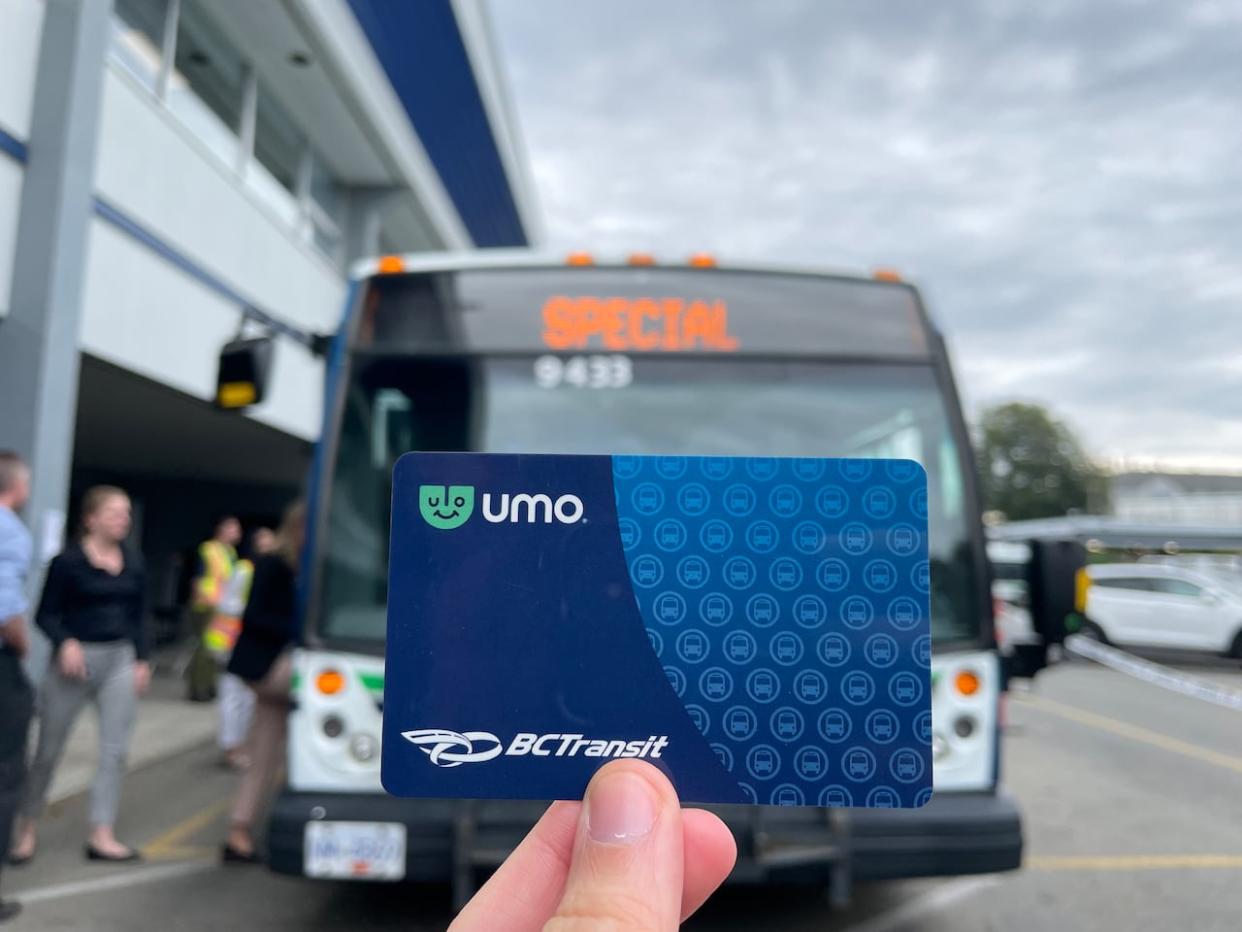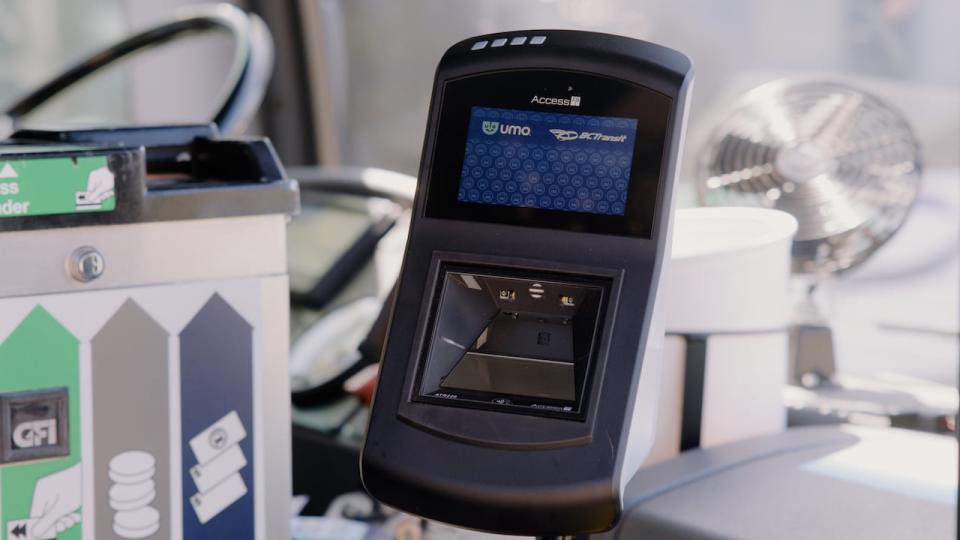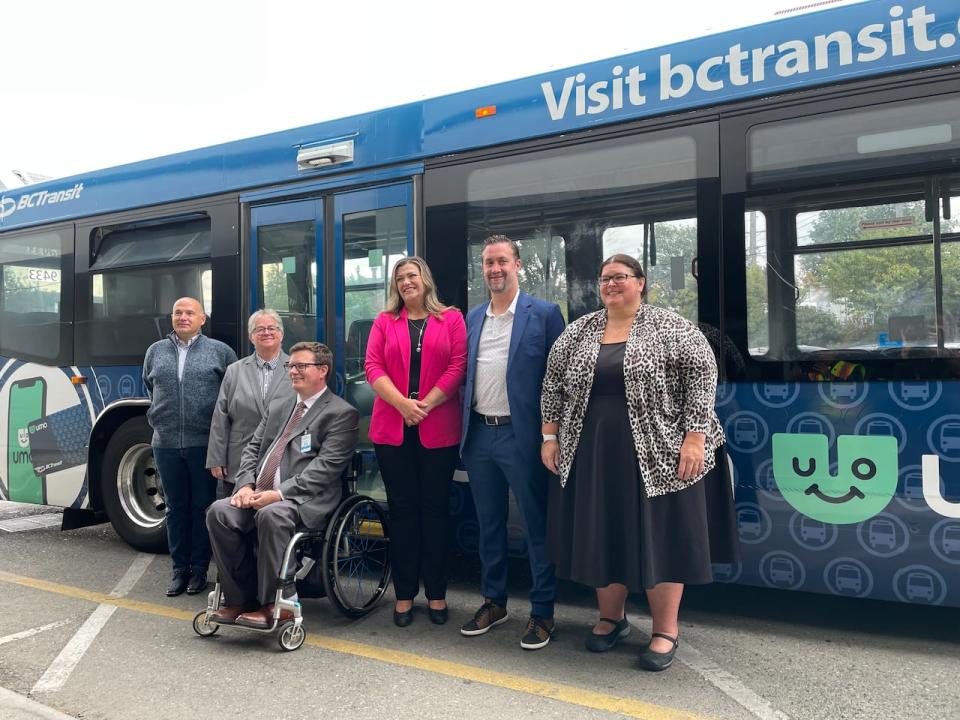B.C. Transit launches electronic fare payment in Victoria, with B.C.-wide rollout to follow

The days of searching through couch cushions for the correct change are over for Victoria transit riders.
B.C. Transit launched its hotly anticipated electronic payment system, Umo, allowing riders to tap and go with their Umo app or card, which they can load online or through a B.C. Transit call centre.
Previously, riders had to pay for their fares by cash with the correct change or buy paper bus tickets or monthly pass cards in advance at stores. The new system will function similar to Metro Vancouver's Compass Card — but without the ability to tap debit or credit cards, a function B.C. Transit hopes to roll out in the spring or summer of 2024.
Martha Martinez, a bus driver with B.C. Transit for the last two years, said she was excited to see her first passengers using Umo during the pilot program when it began in March.
"I think it's great," said Martinez. "It's moving into the new century and moving away from coin jams and tickets getting stuck."
Although it is currently just in Greater Victoria, Umo will soon be available in communities across B.C., with a phased rollout starting in October and finishing by the fall of 2024, according to B.C. Transit.
System improves accessibility and ease, says transit
With the new pass, B.C. Transit is also making changes to its fare system. Riders can load a cash balance on their card or app, which can be used to pay for transit trips. It says daily fares are capped at $5 — the cost of a day pass – so further travel will not cost riders as they continue to tap their card or app.
Cards are available for free at sites across Greater Victoria — including Victoria City Hall, London Drugs, and local university campuses. B.C. Transit has a full list of pick-up locations on its website.
Ryan Dennis, B.C. Transit's director of revenue development, says the innovation is intended to improve the accessibility and ease of using transit.
"Really, it comes down to increasing convenience and reducing barriers," he said. "We really hope to see it increase ridership."

People can now tap their Umo card or app to pay for a ride on buses in Greater Victoria. (Submitted by BC Transit.)
The Umo app will also allow riders to see real-time bus tracking and route maps.
Starting in October, Dennis says B.C. Transit will begin launching the new system in stages throughout other communities — starting on the island, then moving to the rest of B.C.
He says the rollout will move up island first before reaching into the Sunshine Coast, the Lower Mainland, the Interior and finally, northern B.C.
"I look forward to seeing Umo rolled out in all of B.C. Transit's 29 regional systems and the eventual transition into a fully integrated tap-to-pay system across the province," said Dan Coulter, B.C.'s minister of state for infrastructure and transit.
Long time coming
Drivers have been asking for a tap-to-pay system for a "very long time," Dennis said, and the project has been underway at B.C. Transit for the past two years.
This is the first time Umo has been used in Canada, although it recently launched in Milwaukee, Wisconsin.

From the left, Capital Regional District board chair Colin Plant, Victoria Mayor Marianne Alto, B.C. Minister of State Infrastructure Dan Coulter, B.C. Transit vice president of strategy and public affairs Christy Ridout, the chair of the Victoria Regional Transit Commission Ryan Windsor, and Bonnie Crawford, the general manager of Umo Mobility. (Emily Fagan/CBC News)
Next, Dennis says B.C. Transit is working to make the tap system compatible with credit and debit cards so people can pay directly when they get on the bus. He says they are working to make sure the process is secure and works smoothly.
"It's a bit more complicated than the app and the card," he said. "The more technical architecture in the background, that will potentially be something that we need to educate our riders about, that you need to take one card out and make sure you're not tapping multiple cards in your wallet at the same time."
He says B.C. Transit is currently aiming to launch that in spring or early summer 2024 and anticipates more details will be available in the coming weeks.


